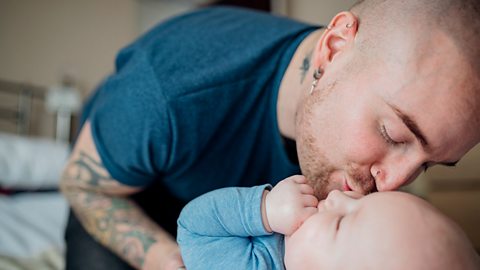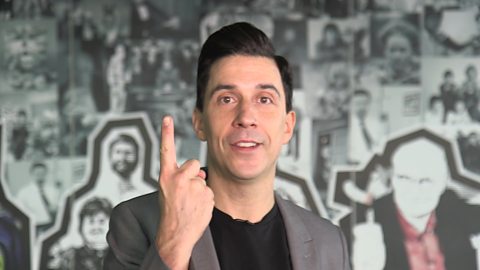Becoming a dad can trigger a whole range of emotions – from overwhelming joy to utter fear and everything in between.
Throw in a lack of sleep, broken routines and hormonal changes (yes, dads have those too) and it’s not unusual to feel completely off-kilter.
In fact, studies show that about one in 10 men experiences mental health difficulties in the first six months after baby arrives, with first-time dads and younger dads particularly vulnerable. And although awareness is growing, dad’s wellbeing can get side-lined, explains mental health specialist Raoul Lindsay.
"When baby is born, the focus is quite rightly on mum and baby and dads are kind of in the background. But you need support too."
We wanted to highlight the life-changing experience of becoming a dad and offer some advice for new dads' wellbeing. Here are some tips you can try to help keep your mental health in check…

Mental health guide: 7 tips for new dads
1. Ease up on yourself
New dads put a lot of pressure on themselves, says Raoul. “One thing that comes up a lot in my work is this belief that you need a new set of skills to be a successful dad, while mums have this natural maternal instinct.”
In truth, being a parent doesn’t come easily to anyone.
I wish new dads knew there’s no such thing as a Super Dad.
"One thing I tell dads as part of recovery is to get hands-on and be silly with your baby. Move away from thinking that have to be the logical, hunter-gatherer parent while mum is the nurturing parent. Also trust your instincts; yes, take on information and other people’s advice but above else, have faith in your own judgement.”
2. Connect and communicate with your partner
Good communication with your partner is an important way to feel calmer and more confident about your parenting.
“It’s especially important in the early stages. Sharing duties like night feeds, planning things as much as possible, recognising that you both need rest. It’s all about being able to speak to them about what’s happening and think practically together about what you can do,” says Raoul.
Connect, listen, ask questions and find out what each other really needs, adds Raoul.
“Your partner is the person you can trust and you feel most comfortable with, so in theory this shouldn’t be hard. But sometimes we guess what our partners need without getting actual information from them. You can do all the things under the sun to help each other feel better but until you ask each other, it’s just a guessing game, which can trigger even more worries about not being able to support them or be a good parent.”
3. Do things that help you feel balanced
Sounds undoable when there is barely time to draw breath, but Raoul advises finding a new routine that helps you retain some sense of calm.
“Think about what helped you unwind, regulated and relax before you had a baby, and see if you and your partner can find ways you can lever it into your new life in some way."
There’s no point trying things you didn’t do before just because you think they might help, like gardening or reading for example.
"If you want to spend some time playing a games console, there’s nothing wrong with that. Perhaps health and fitness is your thing and you're feeling sensitive about your 'dad bod' and there's a way you can fit in a trip to the gym or a run. Whatever helps you.”
4. Chat to other new dads
Don't underestimate the power of talking to people in exactly the same situation as you, says Raoul.
“You will be surprised how helpful it can be to open your eyes to what you need. It’s something that was important to me when I first became a dad. The opportunity to chat to other new dads who know what you’re going through, to exchange parenting tips and arrange social things, like a walk together when you feel comfortable, is so valuable.”

5. Remember that parenthood will get easier
“You can miss your pre-dad life a lot in the early stages of being a new dad,” says Raoul.
“So, it’s important to remember that the difficulties are temporary, you will return to a sense of ‘normality’ whatever that was – better sleep, quieter moments with your partner, more time to see friends and family and so on."
Recognising that with time and experience things won’t seem so challenging is a very positive tool.
6. Be aware of your mood
Most new dads feel low at some point, but if these feelings linger and last for a long period, it could be a sign of depression.
“Some anxieties are natural, for example, how you’ll be as a dad or logistical changes like paternity leave,” explains Raoul. “What’s important is to recognise when the worry continues for too long, or when it becomes debilitating. For example, you might experience physical affects like panic attacks or not be able to return to a regular, calm state. You might notice that your eating habits change so you’re eating more or less than you usually do, or that your sleeping patterns change.”
Depression is a different experience for everyone.
So, it’s really important to keep a close check on yourself and look out for anything that’s unusual for you.
“Things like feeling withdrawn socially, if you’re not taking pleasure from activities you used to love or lacking the desire to do them at all, or if you’re feeling worried about the things you weren’t worried about before,” says Raoul.
Check out the NHS guide to low mood, sadness and depression.
7. Open up to someone you trust
If you are feeling continually low, don’t be afraid to share how you’re feeling.
It doesn’t matter who you talk to, just so long as it’s someone you trust and who will listen, says Raoul.
“Initiating this chat is really hard so take small steps. It doesn’t have to feel like a big conversation. It might not be about asking for help – it might just be about informing someone about something that’s happening right now.”
Further information
For more information about mental health and wellbeing, check out the dedicated area on the NHS website
BBC Action Line also has details of organisations that can help support you.






